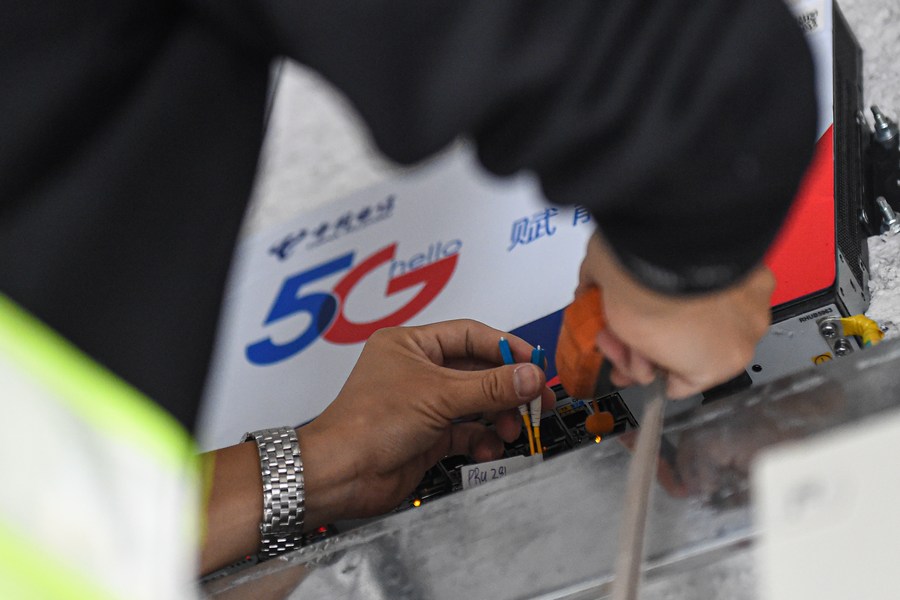- It remains unclear whether the pandemic can be effectively controlled by 2021;
- Turbulence ahead with regions in the world facing different kinds of problems;
- Pandemic has severely hit the global economy, while "the ascent out of this calamity is likely to be long, uneven, and highly uncertain"
- The expansion of 5G applications, its ultra-high speed, ultra-low latency, and ultra-large connection characteristics, will empower the digital transformation of industries.
BEIJING, Dec. 29 (Xinhua) -- As the world prepares to bid farewell to the year 2020, one question becomes glaringly evident: How will the world look like in 2021?
MANY UNCERTAINTIES
The number of COVID-19 cases worldwide has surpassed the 80 million mark. Fortunately, more advances in vaccine development and drug therapies are expected to bring hope to ending the deadly pandemic in the new year.
Recently, as the virus continues to ravage the globe, mass vaccination drives have started in a growing number of countries. Meanwhile, results from clinical trials in Brazil and Turkey have confirmed the efficacy of Chinese vaccines.

A medical worker prepares a dose of the COVID-19 vaccine at the San Filippo Neri Hospital in Rome, Italy, Dec. 28, 2020. (Photo by Alberto Lingria/Xinhua)
Yet, concerns emerged over new COVID-19 strains detected in Britain, South Africa and Nigeria.
Though many are looking forward to a vaccine as the "ultimate weapon" against the novel coronavirus, it remains unclear whether the pandemic can be effectively controlled by 2021, given uncertainties such as vaccination rates, duration of antibody protection, and new coronavirus variants.
"Progress on vaccines gives us all a lift, and we can now start to see the light at the end of the tunnel. However, (the) WHO (World Health Organization) is concerned that there is a growing perception that the COVID-19 pandemic is over," WHO Director-General Tedros Adhanom Ghebreyesus told a Geneva media briefing earlier this month.
The pandemic still has a long way to run, he warned.

People visit the Lincoln Memorial in Washington, D.C., the United States, on Dec. 27, 2020. (Photo by Ting Shen/Xinhua)
TURBULENCE AHEAD
In the United States, after this year's complicated presidential election, President-elect Joe Biden will take office on Jan. 20, with the fight against the virus and economic recovery as his administration's top priorities.
Yet, what lies ahead of the new administration is a deeply troubled and divided society. Driven by the ravaging pandemic, economic downturn, high debts, and two-party rivalry, the political battle in the country will likely drag on into the next year.
With ties between Russia and the West slumping to a new low following the Ukraine crisis, Russia's relations with the United States and other Western nations could remain frosty in the new year considering Biden's description of Russia as "the biggest threat" to U.S. security.
In the crisis-torn Middle East, senior Iranian commander Qasem Soleimani and top nuclear scientist Mohsen Fakhrizadeh were assassinated; Turkey was involved in conflicts in Libya and Nagorno-Karabakh, with its relations with Greece and Egypt at odds due to tensions in the Eastern Mediterranean -- all revealing a trend of turmoil that could continue into the new year.
Britain and the European Union (EU) on Thursday finally secured a free trade deal following nine months of tortuous negotiations.
The trade deal will certainly help avoid a Brexit cliff edge on Jan. 1, 2021, but it is not a Christmas gift for all. Challenges remain as Britain and the EU part as "old friends" in the new year.

A woman wearing a face mask walks in a shopping center in London, Britain, on Dec. 18, 2020. (Xinhua/Han Yan)
STRUGGLING ECONOMY
On the economic front, the pandemic has pushed the global economy into a recession. With such efforts as vaccination, the global economy is expected to gradually emerge from the shadow of the coronavirus next year, despite risks including vaccines' uncertain effects, the resurgence of infections and a surge in debt.
In its October 2020 World Economic Outlook report, the International Monetary Fund (IMF) revised up the 2020 forecast for the global economy to a contraction of 4.4 percent, a less severe contraction than the forecast in its June update.
The revision, the multilateral lender said, is "driven by second quarter GDP outturns in large advanced economies, which were not as negative as we had projected; China's return to growth, which was stronger than expected; and signs of a more rapid recovery in the third quarter."

Photo taken on Dec. 24, 2020 shows an empty street in Rome, Italy. (Xinhua/Cheng Tingting)
However, "renewed virus outbreaks in many economies, and the containment measures being introduced, have checked the pace of the global rebound from the output collapse in the first half of 2020, and are likely to result in further near-term output declines, particularly in many European economies," the Organization for Economic Co-operation and Development (OECD) said in its economic outlook released earlier this month.
Analysts have said that over the short term, the re-introduction of coronavirus-containment measures in some countries will restrain the momentum of economic recovery. Over the longer term, the pandemic has severely hit the global economy, leading to rising debts, and disrupting global growth potential.
Thus, "the ascent out of this calamity is likely to be long, uneven, and highly uncertain," IMF chief economist Gita Gopinath wrote in an October blog.

A staff member tests 5G signal at Haikou Meilan International Airport in Haikou, south China's Hainan Province, Dec. 24, 2020. (Xinhua/Pu Xiaoxu)
5G HEAT
The year 2020 is the year of large-scale 5G construction. With the gradual completion of 5G infrastructure construction in some countries, 5G applications will continue to grow in prominence in 2021, which seems to foretell the advent of a new era of "Internet of Everything."
In the past year, 5G has accelerated its commercial launch, creating new application scenarios in various fields and gradually developing into a key cornerstone for the development of the digital economy.
For instance, China had set up 718,000 5G base stations as of November this year. In the country, the top-level design of 5G applications continues to be optimized, and related manufacturers have formed advantages in technology, equipment and innovative solutions, which has also helped bolster the global 5G market.
In the new year, with the expansion of 5G applications, its ultra-high speed, ultra-low latency, and ultra-large connection characteristics will empower the digital transformation of industries.
Also, 5G, industry insiders say, will efficiently connect such new infrastructures as big data centers, artificial intelligence, and industrial Internet, and advance the realization of industrial technological transformation and optimization with digitalization, networking and intelligence as the main directions. ■


